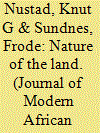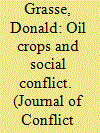|
|
|
Sort Order |
|
|
|
Items / Page
|
|
|
|
|
|
|
| Srl | Item |
| 1 |
ID:
157766


|
|
|
|
|
| Summary/Abstract |
This paper provides a broad review of agrarian change in Ghana by highlighting the major developments in the agrarian political economy and their implications for agricultural commercialisation and its modifying influence on land tenure systems, livelihoods, production systems, social relations, and labour relations. While current land tenure arrangements and labour relations in Africa are often explained in terms of globalisation, we argue that the historical context of agricultural commercialisation in Ghana shows continuities and discontinuities in agrarian relations from the colonial period to the present. We also argue that changes over the years have blended with globalisation to produce the distinct forms of labour relations that we see today. The commercialisation of agriculture in Ghana has evolved progressively from the colonial era aided by policies of coercion, persuasion and incentives to its current globalised form. The expansion in the range of commodities over time necessarily increased the demand for more land and labour. The article contributes to the literature by providing great insights into changes in land and labour relations due to increasing commercialisation, and how these enhanced wealth accumulation for the richer segments of society and global capital to the detriment of the poor throughout Ghana’s agrarian history.
|
|
|
|
|
|
|
|
|
|
|
|
|
|
|
|
| 2 |
ID:
178007


|
|
|
|
|
| Summary/Abstract |
The emergence of medium-scale farms is having important consequences for agricultural commercialisation across Africa. This article examines the role of medium-scale A2 farms allocated following Zimbabwe's land reform after 2000. While the existing literature focuses on changing farm size distributions, this article investigates processes of social differentiation across medium-scale farms, based on qualitative-quantitative studies in two contrasting sites (Mvurwi and Masvingo-Gutu). Diverse processes of accumulation are identified across commercial, aspiring and struggling farmers, and linked to contrasting patterns of agricultural production and sale, asset ownership, employment and finance. The ability to mobilise finance, influenced by the state of the macro-economy, as well as forms of political patronage, is identified as a crucial driver. Contrary to assertions that A2 farms are largely occupied by ‘cronies’ and that they are unproductive and under-utilised, a more differentiated picture emerges, with important implications for policy and the wider politics of Zimbabwe's countryside following land reform.
|
|
|
|
|
|
|
|
|
|
|
|
|
|
|
|
| 3 |
ID:
122789


|
|
|
|
|
| Publication |
2013.
|
| Summary/Abstract |
Green-grabbing has recently been suggested as a label for describing processes of dispossessions undertaken in the name of conservation in sub-Saharan Africa. For the case examined here, the Dukuduku forest and the Mfolozi flats in northern KwaZulu-Natal, we will argue that the label obscures more than it helps illuminate the complex processes leading up to the present-day struggle over land rights. The land in question has been subjected to a number of different land uses in the past: hunting, conservation, commercial agriculture and small-scale agriculture. We show how contestation over desirable future land use options lies at the heart of the problems raised by an ongoing land claim to the forest.
|
|
|
|
|
|
|
|
|
|
|
|
|
|
|
|
| 4 |
ID:
186816


|
|
|
|
|
| Summary/Abstract |
When do agricultural transformations impact social stability? Cash crops are typically associated with economic prosperity and social peace. I argue agricultural booms may spur violent conflict over resource allocation by pitting would-be producers against incumbent landowners when the gains from production are concentrated and the negative externalities are diffuse. I study the rapid expansion of oil palm in Indonesia, a growingly important crop in the global economy. I find when oil palm grows more valuable and expands within producing districts, violent resource conflicts increase. The positive relationship does not exist for other cash crops, nor other types of conflict, and is moderated by the presence of sustainability certified processing mills. The results connect commodity shocks to non-state violence over resources, and suggest land use change is an important mechanism connecting agricultural booms to social conflict.
|
|
|
|
|
|
|
|
|
|
|
|
|
|
|
|
|
|
|
|
|